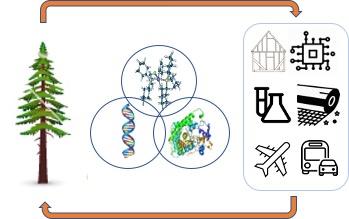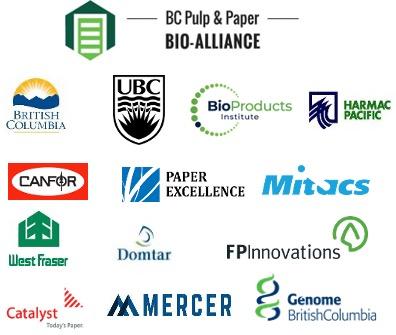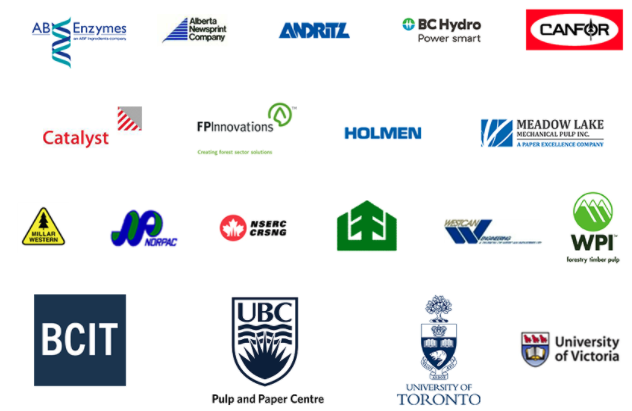Research Themes
Biocatalytic transformation and engineering of biomass
The theme encompasses the biosynthesis and biological degradation of biomass as well as the engineering of these processes to extract and valorize the different biomass components. Fundamental research is aimed at understanding how genes and their products function in the context of complex biological systems to synthesize, assemble and degrade biomass. Applied research includes using protein engineering and synthetic biology to design “biomass crops” and biocatalysts. These applications include developing new biocatalytic routes to valorize biomass, to reduce energy requirements and waste production, as well as to functionalize biomass for novel uses in chemical and materials manufacturing.
Bio-nanoparticle enabled materials
This theme examines the parameters that dictate assembly into supramolecular structures as well as the fundamental interactions between bio-based nanoparticles and surrounding liquids, and other components in composite and hybrid materials. The studies aim to elucidate the effects of nanoparticle production parameters, post-production modification routes, and material processing on physicochemical properties to optimize performance and impart unique structural, conductive, thermal, optical, dispersibility, biocompatibility, and diagnostic abilities.

Bio-based polymers and carbon materials
Bio-based polymers have unique functionality and variability unavailable in synthetic materials. Researchers in this theme have interest in identifying structural attributes of these polymers and establishing structure-property relationships to understand the impact of structures on their thermo-physical and rheological properties as well as processing (including 3-D printing). Research in this theme will seek a fundamental understanding of the materials and their potential transformation into advanced bioproducts.
Biorefinery & Biofuels systems
To achieve an effective reduction in the carbon intensity footprint of our global society will require a multi-prong approach. British Columbia is endowed with plentiful “green” (hydro) electricity, innovative policies such as the low carbon fuels standard, and an innovative forest sector. For example, decarbonizing long distance (planes, ships, trains and trucks) transport will require some form of biofuels. This theme looks at how we move from a hydrocarbon to a carbohydrate society: forest/agricultural resides will be transformed through a biorefinery into chemicals and fuels that are functionally equivalent or superior to the products we now make from oil. In addition to the technical aspects of biorefining the economic, sustainability and policy metrics required to transform our current oil-based society to a more sustainable world will be researched.
Initiatives
BC Pulp and Paper BioAlliance
UBC has been an active participant in the development of the 2016 Forest Sector Competitiveness Strategy in partnership with the BC Ministry of Forests, Lands, Natural Resource Operations and Rural Development, FP Innovations and forest sector CEOs, including those of Canfor, Catalyst, Paper Excellence, West Fraser, Domtar and Harmac Pacific. One of the key recommendations was the establishment of the BC Pulp and Paper BioAlliance (BioAlliance) to identify, research and deliver “best bet” technologies for the provincial industry to accelerate the biobased economy.

Energy Reduction in Mechanical Pulping
The Energy Reduction in Mechanical Pulping (ERMP) research program brings together a unique technical team of mechanical pulp producers, associated supplier industries, research institutes, universities, utilities and governments to develop and demonstrate the technologies to reduce electrical energy consumption and innovate new products specifically for the mechanical pulp producers. The industrial consortium, matched by Natural Sciences and Engineering Research Council of Canada (NSERC), invests in the new approaches to innovation developed by researchers from the Universities of British Columbia, Victoria, Toronto, and BCIT and in the associated equipment at UBC’s Pulp and Paper Centre.

The BC-SMART Biofuels Consortium
The BC-SMART Biofuels Consortium strives to help deliver the BC government’s CleanBC GHG emission targets by developing Sustainable, low-carbon intensity drop-in biofuels for long-distance transportation sectors, including Marine, Aviation, Rail and long-distance Trucking (SMART). The consortium encourages the production and use of low carbon intensity biofuels for long-distance transport. We are a “coalition-of-the-willing” of industry, British Columbia (BC) government and academic stakeholders committed to decarbonising long-distance transport in British Columbia and beyond.
